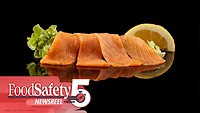Report Shows Strengths and Weaknesses of EU National Food Safety Control Systems in 2022

Image credit: Freepik
The European Commission recently published its annual report on official food safety controls carried out in EU Member States throughout 2022. Overall, the Commission concluded that national authorities have the necessary systems in place to monitor EU food safety and carry out enforcement actions, although some shortcomings were noted in certain countries’ control systems.
In 2022, five million official food safety controls were carried out by EU national authorities, and approximately 16.4 million businesses fell within the scope of jurisdiction. A total of 1.2 million noncompliances were reported, resulting in 475,000 administrative penalties and 12,000 legal actions.
The majority of official controls were conducted in relation to foodservice (1.2 million) and food wholesale businesses (1.1 million). Interestingly, the least number of controls were conducted at farming operations (587,219), although farming was by far the most represented sector out of all regulated food businesses, comprising 7.7 million entities.
The greatest number of noncompliances (360,134) and administrative penalties (176,541) were recorded at foodservice businesses. The fewest noncompliances were recorded at farming operations (81,719), and the fewest administrative penalties were taken against food distribution entities (11,911).
The Good and Bad of EU Member States’ National Control Systems
For the annual report, EU countries must submit information about the implementation of their official controls. Some general trends underlined by the Commission in its 2022 report included an increase of controls carried out in comparison to previous years due to the lifting of COVID-19 precautions, although several countries reported negative effects from pandemic measures on their ability to fully carry out official controls. Other factors that hindered inspection programs included resource constraints, animal health issues (i.e., African swine fever and avian influenza), plant health issues, Brexit, and the war in Ukraine.
Regarding actions taken to ensure business compliance with food safety standards, the European Commission highlighted good examples from EU Member States:
- The use of digital solutions in Denmark, such as a risk management tool for food businesses and a tool to check for correct storage temperature
- In Belgium, the implementation of lower fees and a lower frequency of official controls for businesses certified under the national validated self-checking guides
- A new, more advisory approach taken to increasing business compliance in Hungary.
Some countries reported resource deficiencies impeding their ability to effectively carry out official controls:
- The Czech Republic reported a lack of funding for laboratory diagnostics towards the end of the year, resulting in limited sampling and testing
- Bulgaria noted a declining number of officials, as well as a rise in the number of regulated businesses
- Estonia stated that the lack of experts and the resulting length of evaluation times for plant protection active substances and products remain a challenge.
In 2022, European Commission officials carried out 120 actions (e.g., audits) against the official control systems of Member States, resulting in 363 recommendations to EU countries. Highlights from these controls across several food sectors include:
- Fisheries: Issues with the registration of small fishing vessels, controls of landing sites and related operations, and a lack of controls of vessels that land in other EU countries; as well as the use of alternative histamine test methods possibly undermining the reliability and/or validity of test results
- Meat: Weaknesses in the training and supervision of official veterinarians and the effectiveness of controls in low-throughput slaughterhouses
- Dairy: Shortcomings in the enforcement of operator procedures for the testing of raw milk and verifying heat treatment
- Foods of non-animal origin: Insufficiencies in the registration of primary producers for implementing risk-based official controls
- Animal feed: Areas for improvement in the assessment of operators’ hazard analysis and critical control points (HACCP) systems, the implementation of appropriate sampling protocols, and official controls on labeling.
Regarding EU Member States’ food fraud mitigation strategies, the European Commission conducted a project in 2020–2022 to assess the appropriateness and efficacy of national food defense systems, resulting in a report and guidance document published in late 2023. The results of this project confirmed that, overall, EU countries continue to improve their systems and implement controls in this area.
Looking for quick answers on food safety topics?
Try Ask FSM, our new smart AI search tool.
Ask FSM →







.webp?t=1721343192)

